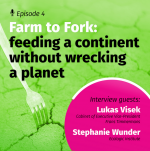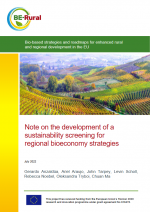Ecologic Institute Newsletter No 239 – August 2022
- Ecologic Institute Newsletter
Farm to Fork: Feeding a continent without wrecking a planet – Podcast
In the fourth episode of the "Green Deal – Big Deal?" podcast, we ask our expert guests, Lukas Visek and Stephanie Wunder, about the food systems approach adopted by the "Farm to fork" strategy and investigate how the strategy will impact producers, consumers and the global food markets. We discuss strategies to address food waste and explore why meat is a politically sensitive topic. New episodes will be released every month and can be accessed directly on our website or streamed on popular podcast platforms.
Development of a Sustainability Screening for Regional Bioeconomy Strategies – Report
This report provides the context and justification for the development of BE-Rural's Sustainability Screening, a description of its methodological procedure, and the syntheses of results from the two experimental implementations of the approach in the Stara Zagora and Vidzeme regions. The last chapters present the main lessons learned from these two pilots and the overall conclusions of the task. The report is available for download.
Negotiations on a Global Plastics Treaty – Article
Preparations for negotiations on a global plastics treaty are currently underway. The treaty is intended to respond to the increasing plastic pollution, especially of the oceans, which requires international cooperation along the value chain and thus binding rules at the international level. The timetable for the negotiations is extremely ambitious, with a draft to be made available as early as the end of 2024. In her editorial, Dr. Heidi Stockhaus highlights the global dimension of the problem and points to the responsibility of Germany and the EU to help the negotiation process succeed. The article is available online.
What We Learned about Coal Phaseout by Studying 15 Countries – Article
Despite the widely recognized need to quickly move away from fossil fuels, particularly coal, many countries continue to invest in this highly polluting energy source. Despite highly country-specific contexts, Ecologic Institute's Dr. Michael Jakob and Jan C. Steckel (MCC/BTU) found that countries can be grouped into four broad clusters: those that have already announced coal phaseouts; those where coal use is in the process of being phased in; established users of the fuel; and major coal exporters. This guest post briefly presents the key findings of the recently published book, "The Political Economy of Coal". The article is available online.
Nature-Based Solutions – What can they really achieve? – Keynote
Nature-based solutions (NBS) and ecosystem-based approaches deliver multiple benefits for ecosystems, biodiversity, climate change mitigation and adaptation, human well-being, as well as many other areas. This topic was explored during the "International workshop on strengthening synergies for biodiversity and climate in multifunctional landscapes". Sandra Naumann, Senior Fellow at the Ecologic Institute, was a keynote speaker, presenting on the potential but also limitations of NBS in achieving climate and biodiversity goals. Her presentation slides are available for download.
Green Cities for the Heat – Interview
Concrete and asphalt make cities up to 10 degrees hotter than rural areas. In Poland, however, there is a persistent impression that green spaces are a nuisance that is best gotten rid of, says Ewa Iwaszuk of the Ecologic Institute Berlin. She points out that the situation in Germany is better, because nature has been considered an indispensable part of the city since the 1990s. She talks about innovative nature-based solutions that can mitigate climate change in cities and explains the introduction of blue-green infrastructure. Monika Sędzierska from the COSMO editorial office moderated the conversation. The interview in Polish can be accessed online.
How Germany Can Cope with Future Droughts – Interview
In an interview with Sinan Reçber of the Berlin daily Der Tagesspiegel, Rodrigo Vidaurre and Benedict Bueb of Ecologic Institute discussed what measures can be taken in various sectors to lessen the impact of droughts in Germany. In addition to water-sensitive urban development, which increasingly relies on nature-based solutions to store water during dry periods, this includes the cultivation of drought-resistant agricultural varieties as well as the rewetting of peatlands.
Embedding the Topic of Pharmaceuticals in the Environment in Pharmaceutical and Medical University Teaching as well as Education and Training – Workshop
During a two-part online workshop in June 2022, stakeholders discussed different possible design approaches of information and teaching materials for an environmentally-conscious use of human pharmaceuticals. The workshop agenda and presentation slides are available for download.
Lawyer with Focus on Energy Law and/or Climate Law
To support our team in Berlin, we are looking (as soon as possible – in full or part-time) for a lawyer with a focus on energy law and/or climate law. In the advertised position you will work on highly relevant issues concerning energy and environmental law with the legal team at the interface of the energy and climate teams. You will have the opportunity to actively shape framework conditions for the energy transition.
Lawyer with Expertise in Environmental Law
To support our team in Berlin, we are looking (as soon as possible – in full or part-time) for a lawyer with expertise in environmental law. Are you a young professional with first work experience who wants to support our legal team in the areas of policy advice and research? If so, we look forward to receiving your application.
Contents
- Publications
- Farm to Fork: Feeding a continent without wrecking a planet – Podcast
- Development of a Sustainability Screening for Regional Bioeconomy Strategies – Report
- Negotiations on a Global Plastics Treaty – Article
- What We Learned about Coal Phaseout by Studying 15 Countries – Article
- Presentations and Events
- Nature-Based Solutions – What can they really achieve? – Keynote
- Green Cities for the Heat – Interview
- How Germany Can Cope with Future Droughts – Interview
- Embedding the Topic of Pharmaceuticals in the Environment in Pharmaceutical and Medical University Teaching as well as Education and Training – Workshop
- We are Hiring!
- Lawyer with Focus on Energy Law and/or Climate Law
- Lawyer with Expertise in Environmental Law

